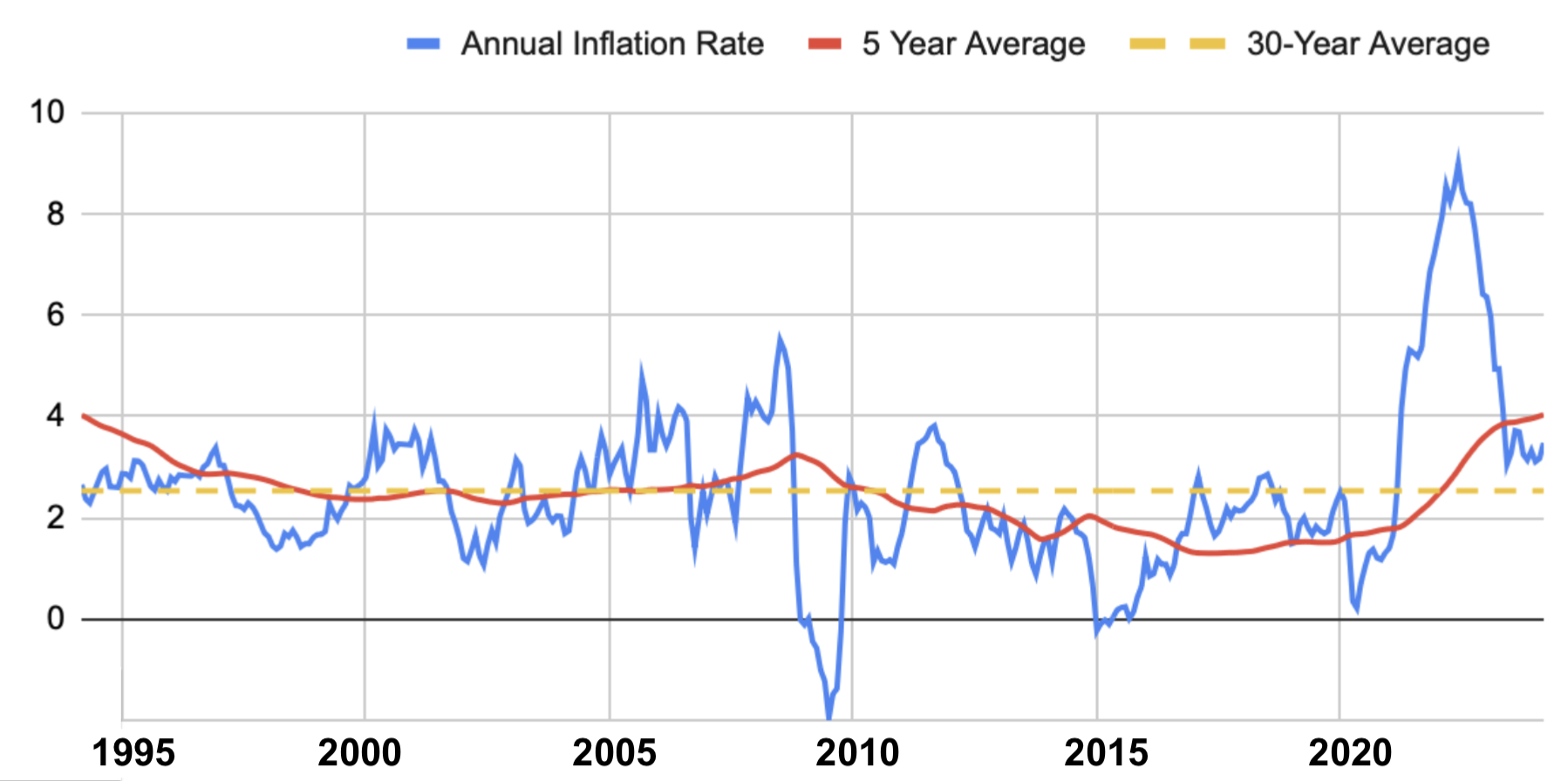|
Today's Opinions, Tomorrow's Reality
Dictators and Day Traders By David G. Young Washington, DC, May 14, 2024 -- Outsourced manufacturing temporarily shielded an entire generation from the pain of inflation. It's time to face reality. When inflation expectations made an unexpected jump last week, it was just the latest piece of bad news for America's stock market bulls. As recently as last Tuesday, analysts were still hoping that America's Federal Reserve would begin cutting interest rates,1 But a jump in inflation expectations by consumers suggests prices may continue to rise. Fed watchers are now talking about the risk of interest rates going up.2 Stock markets are highly influenced by interest rates. Businesses use debt to grease their economic activity, so lower interest rates boost both profits and stock prices. And stock market bulls, day traders, and other lobbyists for low interest rates now have an unlikely new ally: Communist China's dictator Xi Jinping.
Over the past few weeks there has been widespread speculation that Xi may decide to devalue China's currency in order to make its products cheaper on international markets, boosting its exports and stimulating its weak economy.3 For American consumers, cheaper Chinese imports are a key way to hold down inflation. Just a small drop in prices can have a big effect, given that China to the US has hovered at around $500 billion for several years. But using cheap Chinese imports to counter inflation has consequences which have become particularly acute in the Xi Jinping era. The more that America imports from Chinese the more it depends on a potential adversary. As China builds new aircraft carriers, missiles, and nuclear warheads to counter the US military, threatens to invade key US ally Taiwan and bullies the Philippines and Japan, economic dependence on China looks increasingly foolhardy. Back before the Mao suit-wearing, saber rattling communist true believer came to power, technocrats in China and the West built a mutually beneficial relationship. Low labor costs in China allowed America, South Korea, Taiwan and European companies to offshore manufacturing to cut down costs. Western consumers saved money and rural Chinese moved to the city to work in new factories. Everybody's standard of living went up. Between 1997 and 2015, prices for personal computers in America dropped by 96 percent, and for audio and photographic equipment by more than 50 percent.4 All of these items are manufactured predominantly by China and neighboring East Asian countries. Drops in prices for these consumer products were a major factor in holding down inflation over the last 30 years. America's annual consumer price increases were 5 percent or higher in the 1980s and early 1990s. This dropped to increases of less than 2 percent by the 2010s. During the peak of the trend in the mid-2010s, the 5-year average annual rate of consumer price rises bottomed out at 1.3 percent -- more than 2 percentage points below the 30 year mean.5 But for all its benefits, recent history of outsourcing has left America and the West with three enormous problems. Foremost is a dangerous concentration in manufacturing capacity in China relative to the United States and Europe. This has left the West vulnerable both economically and militarily to a giant country that has been taken over by a communist zealot. Second, America and the Europe are in a poor position to rebuild their manufacturing base, because supply chains have shifted so much to East Asia. Components must be shipped from East Asia to Europe and North America in order to make nearly anything. This adds both costs and risks. Doing so anyway means making products that cost more relative to what they would be if they were made in East Asia. Consumers will have to pay more. Finally, an entire generation has grown up in the West with unrealistic expectations about interest rates and price increases. Current home mortgage rates and treasury bond yields are not unusually high by historical standards, but you wouldn't know that from reading head-scratching news articles about "unprecedented" rates likely written by journalists who weren't born before outsourced manufacturing began depressing inflation. Are Westerners ready to face a new era of rising prices? If the West is to decrease its dependency on China, it will have no choice but to face higher prices, meaning higher inflation will be the new norm. The fruits of globalization led to great benefits, but also unacceptable risks for the Western world. Now that it's time to address those risks, Western consumers will have no choice but to foot the bill. Notes: 1. Barron's, U.S. Stock Futures Mixed After Market Rally Fueled by Fed Rate-Cut Hopes, May 7, 2024 2. Reuters, Fed Officials Mull Whether Rates High Enough as Inflation Expectations Jump, May 10, 2024 3. Bloomberg News, Yuan Devaluation Debate Surfaces as Traders Weigh Next FX Shock, April 28, 2024 4. Bureau of Labor Statistics, Long Term Price Trends for Computers, TVs and Related Items, October 13, 2015 5. Bureau of Labor Statistics, Consumer Price Index - All Urban Consumers (CU), 1917-2024, as posted May 14, 2024 |


